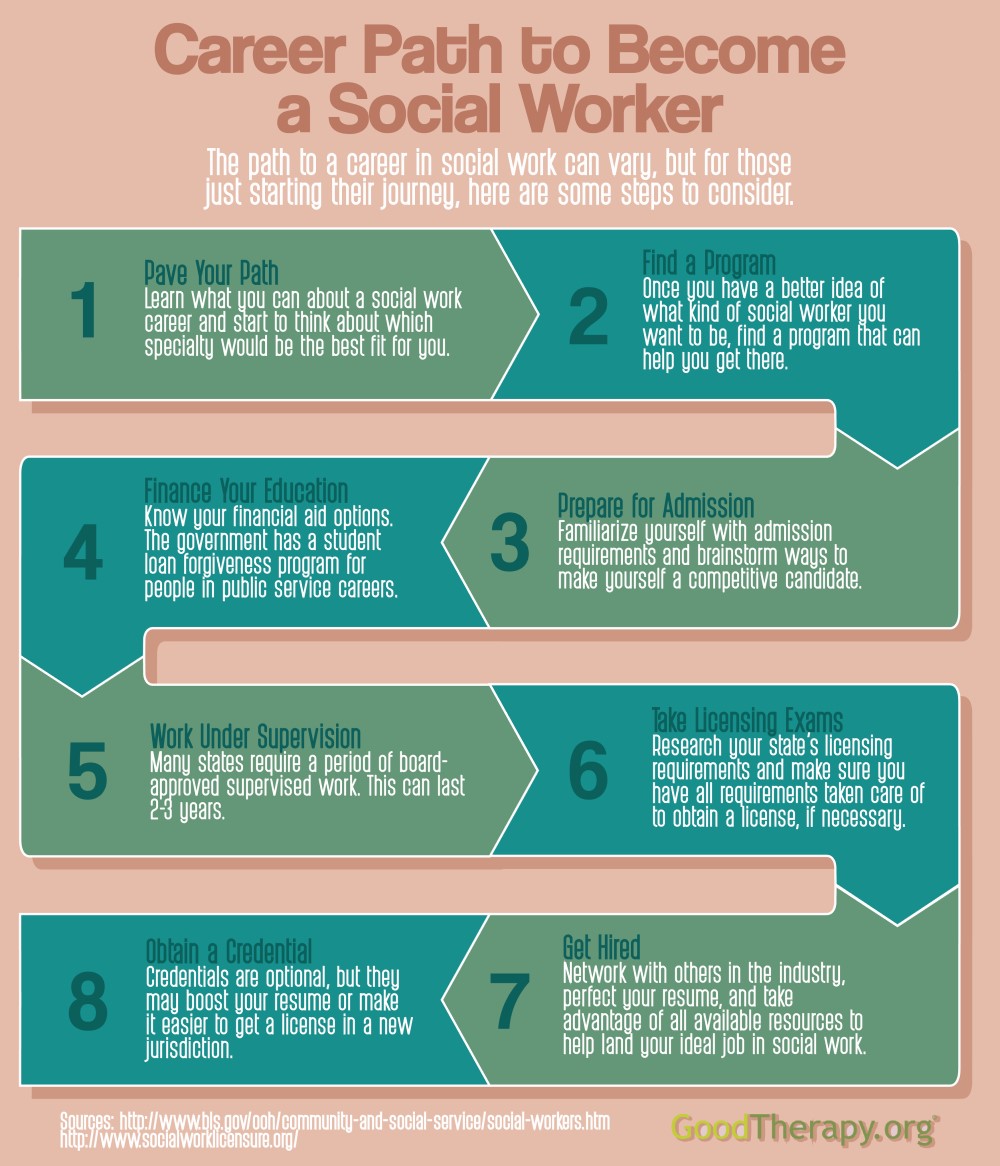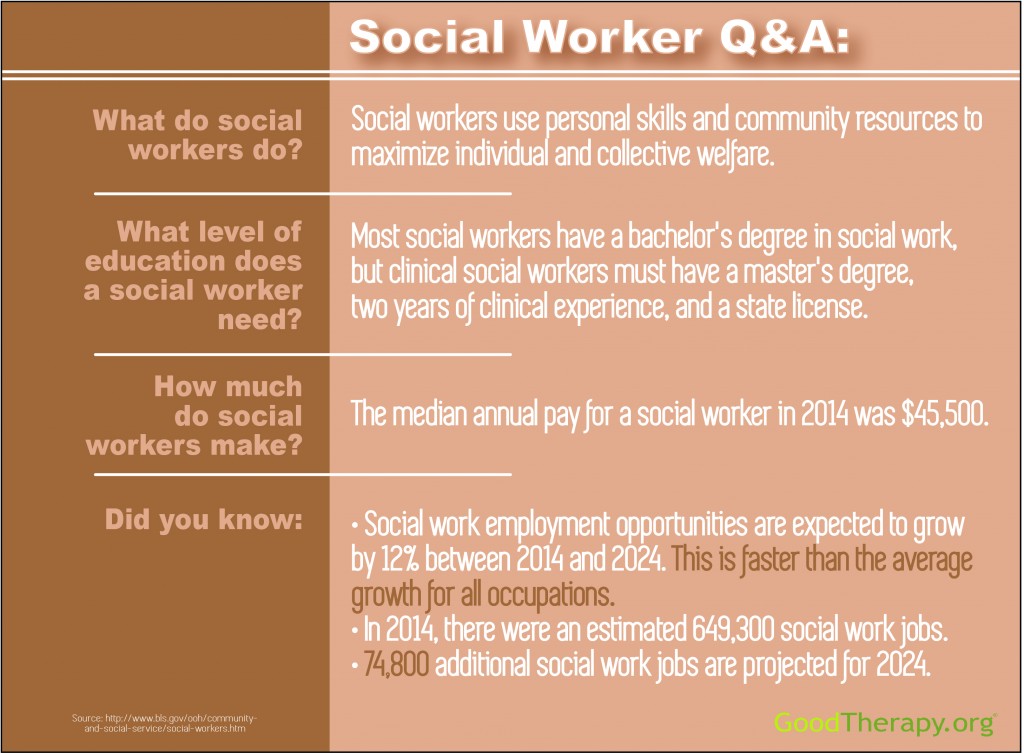By GoodTherapy Staff
Infographics by Hannah Johnson
 Most people drawn to a career in social work have a desire to help those in need. Social workers serve the community by helping people solve and cope with problems in daily life. Clinical social workers may also diagnose and treat mental health conditions, behavioral problems, and emotional issues, similar to therapists and counselors. Just as social workers can take on many different roles in their field, there is no single route to a career as a social worker. If you are considering a career in social work, be sure to educate yourself in order to determine the best option for you.
Most people drawn to a career in social work have a desire to help those in need. Social workers serve the community by helping people solve and cope with problems in daily life. Clinical social workers may also diagnose and treat mental health conditions, behavioral problems, and emotional issues, similar to therapists and counselors. Just as social workers can take on many different roles in their field, there is no single route to a career as a social worker. If you are considering a career in social work, be sure to educate yourself in order to determine the best option for you.
1. Pave Your Path in Social Work
If you are considering becoming a social worker, you can start by learning everything you can about the field. Some ways to learn more about what social workers do include researching online, going to a local library, speaking with a college recruiter, or shadowing a licensed social worker for a day. Next, examine your aptitude for the career. An effective social worker will typically have high levels of compassion and empathy, strong interpersonal and listening skills, well-developed organizational and problem-solving skills, and good time management. Although it is not necessary to decide on an area of interest immediately, it may help to research different specialties within social work. Some of these include:
- Child and family social workers
- Clinical social workers
- School social workers
- Health care social workers
- Geriatric social workers
- Hospice and palliative care social workers
- Medical social workers
- Mental health and substance abuse social workers
2. Find the Right Program for You
When choosing a social work program, it may be helpful to envision a path for your career. Do you want to work in a hospital, public school, or at a non-profit? Do you see yourself more in advocacy or policy change, mental health care, private practice, or the military? The right program for you will depend upon your chosen path. For example, if you’re interested in clinical work, a program with a clinical concentration may be the best fit. Most entry-level positions will require a bachelor’s degree in social work, though some will accept a related field such as psychology or sociology. To work in the clinical field, a master’s degree is necessary. In some states, baccalaureate social workers can obtain licensure, but most require a master's degree. In addition to licensing requirements, there are other advantages of pursuing an advanced social work degree. Master’s level Social Workers (MSWs) often have higher salaries and more career opportunities.

3. Prepare for Admission
Once you have decided on a program and a school, fully understanding and adhering to the admission requirements can make you a competitive candidate. You will need letters of recommendation from people who have known you for at least six months and can easily speak to your skills and attributes. Volunteer work is an excellent way to show commitment and propensity for social work. Many human service agencies have volunteer opportunities to gain valuable experience. Some students interested in social work choose to volunteer for AmeriCorps, a national community service organization that provides small stipends and education awards in exchange for a service commitment.
An accredited social work undergraduate degree is not necessary for admission to a graduate-level social work program. Any undergraduate degree can be sufficient, but a related field may be preferred. You can view the directory of accredited social work programs from the Council on Social Work Education here.4. Finance Your Education
Education can be an expensive investment. Considering financial aid options long before the start of a program can help you get your finances organized. You may qualify for grants, scholarships, or student loans, and some employers may even provide educational assistance. The government also has a student loan forgiveness program available to those who work in the public service field.
5. Work under Supervision after Graduation
In most cases, you will need to work under board-approved supervision for a period of two to three years or 3,000 hours after graduation before applying for state licensure. After receiving a master’s degree, all states require some form of practice for independent clinical licensing if you intend to eventually work in private practice. Many states require a period of supervised work even for non-clinical positions such as administrative work. It may be necessary to check with your state licensing requirements and your admitted program to know for sure what your requirements will be.
6. Take State Licensing Exams
To become a licensed social worker, learning the licensure requirements in your state is a key step. In the past, many jurisdictions would accept bachelor’s degrees in related fields without accreditation, but most states are moving away from this and do require an accredited degree from the Council on Social Work Education (CSWE) or foreign equivalent for licensure. For those with bachelor’s degrees not CSWE accredited, a master’s degree in social work from an institution that is accredited may be necessary. In addition to educational requirements, you will also need to work under supervision, take an exam, and possibly be fingerprinted in some states. You can check your state’s requirements here. In several states, you will need to take the Association of Social Work Boards (ASWB) master's exam before or after graduation. After completion of all other requirements, you will then take a clinical or advanced generalist exam if necessary.
7. Obtain an Optional Credential
The National Association of Social Workers offers an Academy of Certified Social Workers (ACSW) certification. It is not the same as licensing and does not give any legal authority to practice in any state, but it does provide an additional credential to add to a resume. In some cases, the certification may make it easier to receive a new license in a new jurisdiction.
8. Get Hired
Once you have completed your education and licensing requirements, you’re ready to look for social work jobs. Networking can be helpful for getting to know others in the industry, and spending time perfecting your resume and using all resources available to you can make it easier to land your first social work job or start your own clinical practice. For anyone in a therapist or social work career, staying involved in the community and keeping up with your continuing education requirements can help maintain your licensure and expand your knowledge.
References:
- Bureau of Labor Statistics. (2015, December 17). U.S. Department of Labor. Occupational Outlook Handbook, 2014-15 Edition. Social Workers. Retrieved from http://www.bls.gov/ooh/community-and-social-service/social-workers.htm
- Council on Social Work Education. (CSWE). (n.d.). Directory of Accredited Programs. Retrieved from http://www.cswe.org/Accreditation/Accredited-Programs.aspx
- Federal Student Aid. (2015, December). Public Service Loan Forgiveness Program. Questions and Answers for Federal Student Loan Borrowers. Retrieved from https://studentaid.ed.gov/sites/default/files/public-service-loan-forgiveness-common-questions.pdf
- National Association of Social Workers (NASW). (n.d.). Become a Social Worker: Starting out. Retrieved from http://www.socialworklicensure.org/articles/become-a-social-worker.html#context/api/listings/prefilter
- National Association of Social Workers (NASW). (n.d.). Social Work License Requirements. Retrieved from http://www.socialworklicensure.org/articles/social-work-license-requirements.html


.png)